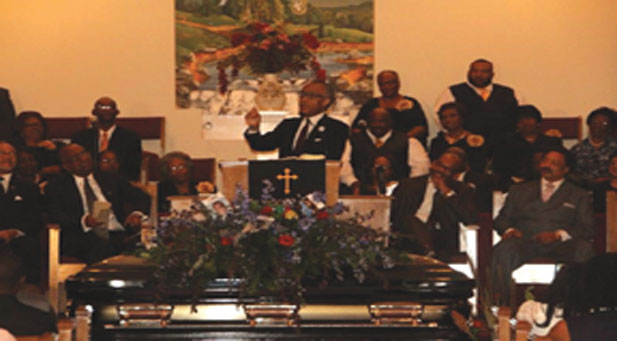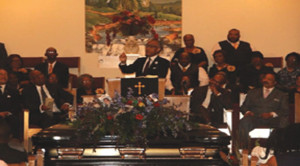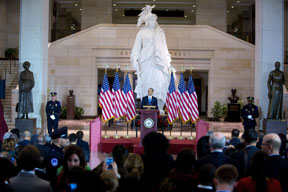
 Sharpton eulogizes George Curry: ’I have fought a good fight, I have finished my course, I have kept the faith!’
Sharpton eulogizes George Curry: ’I have fought a good fight, I have finished my course, I have kept the faith!’
Admonishes Black Press: ‘Keep telling the story!’
Rev. Al Sharpton gives eulogy of legendary journalist George Curry. (Photo by Charles W. Cherry II/Florida Courier)
TUSCALOOSA, ALA. (TriceEdneyWire.com) — One minute the congregation was somber and in tears; the next minute they were rocking to choir music in the pews; the next minute they were laughing in fond memory; and then they were shouting and applauding on their feet.
That was the range of emotions that marked the packed house during the “Celebration of Life” for legendary journalist George Curry at Weeping Mary Baptist Church in Tuscaloosa, Ala., Aug. 27.
Sharpton attended the funeral despite a march against violence in Washington that he was monitoring by phone. “I said I would be here because no matter what he was doing, George was always here – not just for me – but for all of us.”
Reflecting on his friendship with Curry, who appeared on the last hour of his daily radio show every Friday – including the day before he died – Sharpton said, “George never knew that he was much more of a minister to me than I was to him?”
He said among the encouraging principles that Curry taught him was, “It’s not what everybody else thinks of you. It’s about what you think of yourself. And if you grab a hold to what you’re calling is and believe what you think you can be, everybody else’s judgement won’t matter.”
Still, Curry held even his political and civil rights friends accountable.
“He never let his friendship interview with his journalism. He would write against us and praise us the next week if we earned it,” Sharpton said. “At the end of the day the ones that really respect you are the ones that respect you enough to correct you because they don’t give you a cheap way out. And that’s what George would do.”
Sharpton said it was Curry’s courage that marked his unique style of reporting and column writing.
“Progress has never been as a result of people who didn’t take risks. George knew he wasn’t going to benefit by telling Kemba’s story. He knew he’d lose advertisers. He knew he wouldn’t be on “Face the Nation” if he put a handkerchief on Clarence Thomas’ head.”
The audience applauded vigorously at the recognition of both – the Kemba Smith and Clarence Thomas stories, which appeared on the cover of Emerge.
“But he told the truth. He chose his integrity. He chose the roots he got in Tuscaloosa rather than getting a pat on the back from folk that’s going to fire you anyway…George was a man’s man. And a proud man. That’s why George mattered.”
Smith, who called Curry her “hero”, was among the speakers, which also included journalists Ed Gordon and Roland Martin. NNPA President/CEO Dr. Benjamin Chavis and SCLC President/CEO Dr. Charles Steele also spoke. A childhood friend and Tuscaloosa native, Steele also presided at the funeral and the memorial service the night before, where the keynote speaker was the Rev. Jesse Jackson.
Driving home his point, Sharpton humorously rebuked journalists and activists who claim they have a new way of covering or protesting injustices, giving a scenario of one person who tried to convince him that the times had changed and there are new strategies for speaking truth to power.
He told of one person who said this, yet could not answer when asked what new strategies? Dismissing the person’s excuse for not taking a stand, Sharpton said he answered the question for him:
“If you don’t have a strategy, don’t act like you’ve got a different plan,” he said. “If you’re scared, say you’re scared!.. And sit down and shut up and let somebody that’s not scared say what needs to be said.”
Ultimately, it was the Biblical text of the eulogy that brought the congregation to their feet at the end of the three-hour service.
Sharpton preached from II Timothy 4:6-7, 11-13 when Paul, knowing his death was near, said, “I have fought a good fight, I have finished my course, I have kept the faith!”
But, then Paul told Timothy to bring certain things to the jail, including “parchments”, which interpreted, means his writings.
“Bring my books and bring my papers because I did what the rest of the Apostles didn’t do. I wrote the story. And the story would be distorted unless we that lived the story wrote the story!” Sharpton preached.
He admonished Black journalists and publishers, “Keep telling the story…George never stopped. Until the very end, he never backed up and he never compromised. And he never negotiated his dignity for a contract or for a favor. That’s why when we say ‘so-long’, we’ve lost something that we’ll never see that way again. George Curry was part of a long tradition. But he was one of a kind.’”
Mrs. Martha Brownlee, Curry’s beloved mother, who had wept in mourning for her only son as she visited the casket, ended the service dancing in his honor as Sharpton preached and the organ punctuated his message:
“I come to Tuscaloosa to tell you that George won’t be laying in the cemetery. George has got to go through the cemetery. But, George is on his way home now. He fought a good fight! He kept the faith! He finished his course!”
As a final reflection and recognition of the continued struggle at hand, the congregation locked arms and sang the civil rights anthem, “We Shall Overcome.”
“Sometimes Genius is Found in the Cracks”
Prepared text of the Rev. Jesse Jackson Sr. in keynote remarks during “A Time of Reflection” for George Edward Curry on Friday, August 26 at Elizabeth Baptist Church, Tuscaloosa, Ala.
(Photo by PJ Fischer/Tennessee Tribune)
TUSCALOOSA, Ala. (TriceEdneyWire.com) – If when you give the best of your service he will say ‘well done’. Job said when my worst fears come upon me I know my redeemer lives because he lives in my soul. And ‘though you slay me ye will I trust you’. Death cannot break the bonds between George and God and his family and those who came to know and love him.
Tonight George’s life has called forth an unplanned family reunion. We are not here because he died. We are here because he lived and injected life into us. The reality we face tonight is that life is uncertain, and death is certain. With our tools we negotiate life’s challenges and hardships. We finally have run out of negotiating space.
George was born in radical racial segregation. At a time when we could use the hotel, the motel, the library, public park benches. George was born when we could not aspire to attend the University of Alabama at Tuscaloosa, while living and raised in Tuscaloosa. He was born in segregation, but did not internalize it.
He was born in a town with two birds: the eagle flew on one side of town with the power to fly high seemingly without limitations and looking at the noon day sun. On his side of town Jim Crow, the crow flew. He did not bite Jim Crow and its presence did not scare him.
He mastered his environment. He was an odds buster and a dream maker. You have no choice as to where you are born, nor to whom you are born, or the conditions under which you are born. You have to negotiate with what you have to work with. He was born having to play baseball with a short stick.
Somewhere the eagles fly inherit home runs. They are born with scores before they ever go to bat. Some are born on third base, as if they hit a triple. A few are denied the bat, denied the spikes, denied the equipment and play on rocky fields, but still score. They are dream makers and odds busters.
Born behind the high walls of segregation before Rosa Parks sat in, Dr. King proclaimed, before Autherine Lucy was escorted into University of Alabama by the military. He was born with a low ceiling, by law could not stand upright, or dream upright or hope upright; somehow George blossomed in the cracks.
One day while taking a morning walk down the sidewalk two blocks of cement that barely pulled apart, in the cracks, which was supposed to be covered, there was grass growing in the cracks. The soil was supposed have been covered by the cement; but in the crack was just enough fertile soil and water for this seed to blossom into grass and flower.
Life finds a way, sometimes genius is found in the cracks. Not far from here Willie Mays, Hank Aaron, Bo Jackson came out of the cracks and became the best at their chosen profession. As you come into consciousness realize tight space and adjust. Rationalize that this is your plight and develop a cracked complex.
You can resent and become embittered, survive, but never change the limits of your potential. Or you can resist. Something within you can ordain you to make crooked ways straight. It is said that the arc of the universe bends towards justice, but you must have the will to grab the arc and bend it. If the door of justice is too big for you to get open, you should at least leave some footprints or some fist prints showing that you tried to open it with what you had to work with.
In George’s formative years before he was a teenager, he heard the stories of the 5,000 lynchings… He heard the stories of the Scottsboro boys. But in George’s crack was a mother and parents who hovered over their little eaglet whispered in his ear that he was neither row nor buzzard, that he was an eagle. That he could fly high.
Nurtured at home, cultivated at Knoxville College, the school of Vernon Jarret and Michael Dyson. George was maladjusted and restless with indignity. He learned that literacy was the key to liberation. In the shadows of the University of Alabama, he was the rejected stone, but at Knoxville College he became a cornerstone of hope and possibility. What a mind.
I met George in 1980 when we were conducting a boycott on Budweiser opening up the beverage industry. George was writer and interpreter, researcher of that struggle which we finally won. In the 84 campaign his ability, integrity, capacity and convictions were expressed with white reporters confronted him and Sylvester Monroe and Jack White and Ken Walker about the quality of their journalism, the confrontation did not last long and never happen again.
He was a part of that first wave of black journalists on my 84 campaign who interpreted the new day, understood the rule changes and helped to make the case for the new day. We saw his special genius in Emerge magazine, or as an interpreter on BET or as a columnist in NNPA.
What made George different? What do we gather from his genius? He didn’t walk around as a nerd, or a certain kind of unicorn. Genius it is often said should be hard work dressed up in work clothes. The qualities that elevated him from the cracks:
- He had a good mind. Strong minds break strong chains. His mind outlived his body. He died with his shoes on.
- He was physically strong to work long hours, do research, travel around the world. We went to Japan, Morocco, South Africa, France and Britain together. He was able.
- He had the courage of his courage of his convictions. He did not just follow opinion polls, or the politics of his publisher, he had a point of view and molded the culture.
- His mission was greater than his job. When the walls closed in he knew how to move. He had scientific objectivity. He could see other people as they were not as we would have them to be.
- He had confidence in black people. Our progress delighted him. It never surprised him. He knew with Olympic rules we could get the gold medal. He knew that President Barak would overcome a broken home, climb to higher heights and become of source of healing for the nation and world.
- He left the world better than he found it.
Lastly, George had a faith, shaped by his mother and his family in God. He had a faith in God as the righteous judge of the universe, not the Alabama judge limited by the state and culture. He told our story. He told us what we didn’t know. He made us feel better about what we did know. In George we lost a lot, but he left us with a lot.
His heart wore out because he used it so much. It was bigger than normal. I think he may have had an aneurism because he used his brain so much. It has been said a mind is a terrible thing to waste, it is even worse that a mind go unused… We were in Central Africa one night talking about when the time comes, what we want people to say over you. And George said, ‘Stand over me and say, ‘He’s getting up.’…. He will get up one day.




Be the first to comment